“How to work with senior managers who defer to the legal function and the court of law rather than PR and the court of public opinion” was the title of a workshop at the PR Society of America conference Oct. 28 in Philadelphia.
That is exactly the situation that Stephanie Cegielski, VP-PR of the Society, finds herself in.
Under orders from CEO Bill Murray, to whom she reports (there is no reporting line to the board or elected chair), she bombards us with a string of draconian legal pronouncements that wouldn’t get to first base in the Court of Public Opinion.
O’Dwyer reporters, for instance, were barred from all sessions of the 2013 conference. Ironically, we were unable to cover the fascinating session on legal vs. the Court of Public Opinion.
Other reporters were “credentialed” which our lawyers say makes the Society guilty of discrimination. It would take a lawsuit to pursue that claim.
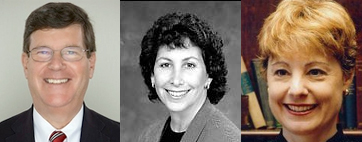 Jennings, Smith, Jalbert |
As long as the board and Assembly approve of Murray’s policies, they are not going to change.
Although blocked from the covering the session, we are trying to contact the panelists, who include two lawyers, in an effort find out how to deal with PR Society staff and leaders who constantly brandish legal swords not only at us but at members.
Jennings, Smith, Jalbert on Panel
The lawyers are Thomas Jennings, partner in the law firm of Hill Wallack, Morristown, N.J., a graduate of Harvard and the law school of Notre Dame, “representing national and local businesses in a wide range of commercial transactions”; Stacey Smith, a partner in Jackson, Jackson & Wagner, Rye, N.H., the firm founded by Patrick Jackson, 1980 president of the PR Society, who has been with the firm since 1981, and Michele Jalbert, who is “of counsel” to JJ&W. She was executive director, policy & strategy, New England Council, “New England’s voice on Capitol Hill, from 2007-2013. She has a law degree from Suffolk University. Her bio says she is “uniquely positioned to help bridge the gap between two often adversarial interests within organizations—PR professionals and lawyers.”
So far we have not been able to reach any of them by phone calls or e-mails. A staff member of Hill Wallack said today that Jennings talked on how PR and legal can work together and would not be available for further comment to this website. He has a "very tough schedule and no information to share with you," said staffer "Kathleen."
Jackson led the shift of Society power from New York to chapters throughout the nation. His policies of press avoidance and staffing h.q. almost totally with non-PR people still dominate. Asked in 1994 by Consuelo Mack of the Wall Street Journal how he dealt with the press, he answered: “We usually duck ‘em, find ways to go direct and screw ‘em.” The Center for Communications published a videotape of the session.
Bad Law Being Practiced by Society
We wouldn’t mind it if good law were being practiced by the Society but that is not the case. The Society has spent $581,608 for legal advice in the past nine years. It has never had a PR firm. It spent $50,554 in 2000-03 for a survey and advice from the Ethics Resource Center but ignored its finding that members want an enforceable Code of Ethics. It has just spent at least $50,000 for a survey and advice on the APR program from consultant Laura Freebairn-Smith who noted the entire process is suspect because the Universal Accreditation Board is dominated by the Society and therefore it’s a case of self-accrediting. “Professional fees” zoomed 70% to $497,194 in the first nine months of 2013 from $284,620 in the 2012 nine months.
Freebairn-Smith’s work was undercut from the start by chair Mickey Nall who said cancelling the program “was not an option.”
Bylaws Rewrite Was a Travesty
The 2009 bylaws rewrite was a legal travesty.
The committee was chaired by Dave Rickey, who was also chair of the 2012 Definition of PR Task Force and 2012 national secretary. He ran for chair-elect but was defeated by Nall. The panel never faced a live audience, causing the resignation of Cynthia Sharpe, former chair of the Sunshine district. She condemned a deliberative process that is “mostly e-mails, phone calls and blog posts.” Ten of those on the 11-member committee were APR when only two should have been to reflect the 82% non-APR membership. Volunteers were sought for the committee when appointments should have been made that reflected all sections of the Society’s membership.
Consideration of an entire new set of bylaws by the Assembly, which took place at its regular meeting on Nov. 7, 2009, violated not only Robert’s Rules but common sense and the rules of fair play.
Robert’s advises that such an undertaking be made at a series of special meetings and never at the regular annual meeting.
The first hour of the Assembly was taken up with the usual speeches including 17 minutes by chair-elect Gary McCormick.
Two hours were wasted on a lunch break. There was only time for discussion of a few of the more than 15 articles that were in the new bylaws. Robert’s requires that all articles be discussed.
Fifty-six proxy votes were used for the purpose of approving proxy voting even though adoption of Robert’s satisfies any state demand for a specific rule barring proxies.
Since proxies were used, the new bylaws can be challenged in perpetuity. The Society paid $98,865 to its law firm Venable in 2008 and $124,016 in 2009 for a total of $222,881 for the two years.
Legal Trumps Ethics at PR Society
IRS Form 990, showing the pay packages of any staffer making more than $100,000, in recent years has been kept from the Assembly and the press until a few days before the final deadline—Nov. 15.
The Society’s claim is that it is following the letter of the law. Initial deadline for this document is May 15 each year.
The Society this year said it made the 55-page document “available” to the Assembly on the day that it met, Oct. 26. However, delegates we talked to said they were not aware of this.
Assembly Didn’t Know of $61K Bonus
If they had access to the 990, they would have found that Murray received a bonus of $61,000 in 2012, resulting in a total package of $423,647. That would have been a topic at the Town Hall.
Cegielski, asked about the bonus, said Murray has fulfilled certain terms in his contract. The LinkedIn entry for Murray, who joined the Society in January, 2007, says “Collectively, my leadership resulted in PRSA meeting or exceeding financial goals for every year of my tenure, including thru the Great Recession.”
Revenues in 2006 were $11,426,867. Six years later, in 2012, they were less than that--$11,083,420. There was a $30 dues increase in 2011.
Dues income in 2007 was $4,952,680, which divided by the $225 rate means there were about 22,000 members. Dues income of $5,133,776 in 2012, divided by the new rate of $255, means there are about 21,000 members.
Not all members pay the full rate. Dues also includes initiation fees.
The official membership total in 2000 was 20,266.
Net assets rose to $4,153,951 as of Dec. 31, 2012 from $2,826,525 at the end of 2006. That might be the basis for the bonus. However, the Society, in violation of section 958-605-25-1 of the Financial Accounting Standards Board, books dues as cash upon receipt when FASB as well as common sense calls for revenue to be booked as earned. This would cut net assets by about $2.5 million.
Member Loses Web Access
The Society’s has removed the web access rights of a member who is accused of forwarding Society financial reports to this website.
The accused did no such thing. He looked at the site, saw that the quarterly figures were there, and told us. He kept a promise to Murray that he would not forward the figures to us. Other members did that. His paid-for membership has effectively been cancelled because the Society provides most of its services via the website.
There is no opportunity to appeal this verdict in the Society’s kangaroo court.
The Society has a “Business Case for PR” but there is no program of speakers from either h.q. or the elected leadership to make public presentations and face the press.
The search committee that hired Murray in 2007 said it was looking for a paid president who would be “visionary,” “charismatic,” and “an accomplished speaker.” The committee was headed by 1997 president Debra Miller and included Karla Voth, then a 16-year staff veteran who is VP of special events; Rickey; Grace Leong, Hunter PR; Ellen Shedlarz, then head of human resources at Hill+Knowlton Strategies; Prof. Robert Pritchard of Ball State University and chair of the Educators Academy, and Pender McCarter, IEEE-USA.
Promise to Auburn Broken
Murray agreed to speak on Jan. 29, 2007 to the class of PR Prof. Robert French of Auburn University. He asked for questions in advance and would only let French pose the questions. Several students excoriated Murray, saying he was unprepared and didn’t know “Jack” about PR. They were surprised that he was hired to be president of a group to which he did not even belong. They rapped the format that blocked their direct questions. One student wrote, “Murray stumbled all over his words and danced around Robert’s questions.”
Following the session, Murray e-mailed French: “If you would find it useful, I’d be happy to do this every semester. Next time I will have absorbed much more, and so we could dig deeper.”
He added that he used to speak “regularly” at USC, UCLA, Thunderbird, Pepperidge and other area schools. “I believe that it is the ‘right thing’ to do,” he told French. He said he always “learned something” in speaking to students.
Murray never talked to Auburn students again or any student group in a session that was open to press coverage, according to our knowledge.


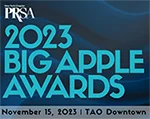 PRSA-NY today announced its five honorary co-chairs for its Big Apple Awards ceremony gala slated for TAO Downtown on Nov. 15.
PRSA-NY today announced its five honorary co-chairs for its Big Apple Awards ceremony gala slated for TAO Downtown on Nov. 15.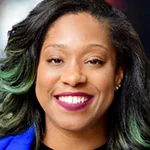 PRSA-NY president Carmella Glover today issued a "heartfelt apology" on behalf of the chapter for her Oct. 14 message that "caused disappointment and hurt to some of our valued members."
PRSA-NY president Carmella Glover today issued a "heartfelt apology" on behalf of the chapter for her Oct. 14 message that "caused disappointment and hurt to some of our valued members."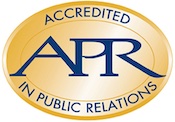 The leadership of Public Relations Society of America is backing a move to change the current “must-have” APR accreditation to “strongly preferred” as a requirement for a seat on its board of directors.
The leadership of Public Relations Society of America is backing a move to change the current “must-have” APR accreditation to “strongly preferred” as a requirement for a seat on its board of directors.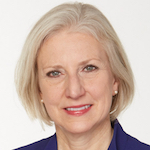 Public Relations Society of American today named Linda Thomas Brooks CEO, succeeding CFO Phil Bonaventura, interim chief since July 2019.
Public Relations Society of American today named Linda Thomas Brooks CEO, succeeding CFO Phil Bonaventura, interim chief since July 2019.


 Have a comment? Send it to
Have a comment? Send it to 
No comments have been submitted for this story yet.